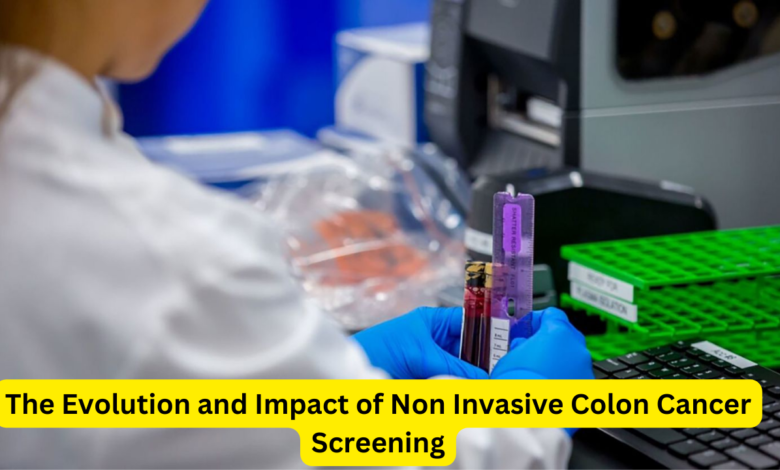Colon Cancer Screening The Evolution and Impact of Non-Invasive

Colon cancer is a leading cause of cancer-related deaths worldwide. Early detection is crucial for effective treatment and increased survival rates. Traditional colonoscopy has been the gold standard for screening, but non-invasive methods are revolutionizing the field. This article delves into the growth, trends, and future forecasts of the non-invasive colon cancer screening market, focusing on key types, applications, and regional insights from 2024 to 2031.
Understanding Non-Invasive Colon Cancer Screening
Non-invasive colon cancer screening tests are designed to detect colorectal cancer without the need for invasive procedures. These tests primarily include stool-based screening methods such as fecal immunochemical tests (FIT) and multi-target stool DNA tests. They work by analyzing stool samples for hidden blood or cancer-specific DNA markers. These methods offer a convenient and less intimidating alternative to colonoscopies, encouraging more individuals to participate in regular screening.
Types of Non-Invasive Screening Methods
1. Fecal Immunochemical Test (FIT)
The Fecal Immunochemical Test (FIT) detects hidden blood in the stool, which can be an early sign of colon cancer. This test is simple, non-invasive, and can be done at home. It is highly sensitive to bleeding in the lower gastrointestinal tract, making it an effective tool for early detection.
2. Multi-Target Stool DNA Test
The multi-target stool DNA test analyzes stool samples for multiple DNA markers associated with cancer cells. It also detects hidden blood in the stool. This test has a higher sensitivity than FIT and can identify both pre-cancerous and cancerous conditions.
Growth Analysis of the Non-Invasive Colon Cancer Screening Market
The non-invasive colon cancer screening market is witnessing significant growth due to several factors:
Increasing Awareness and Demand
With growing awareness about the importance of early cancer detection, more individuals are opting for non-invasive screening methods. Public health campaigns and educational initiatives are playing a pivotal role in increasing participation rates.
Technological Advancements
Advancements in biotechnology and molecular diagnostics are enhancing the accuracy and reliability of non-invasive tests. These innovations are making screening more accessible and effective, driving market growth.
Regulatory Approvals and Reimbursements
Government approvals and favorable reimbursement policies are encouraging the adoption of non-invasive screening tests. These policies reduce the financial burden on patients, making screening more affordable.
Segmentation Analysis by Type, Application, and Region
By Type
The market can be segmented based on the type of non-invasive screening tests:
- Fecal Immunochemical Test (FIT)
- Multi-Target Stool DNA Test
- Other Stool-Based Tests
By Application
Non-invasive colon cancer screening tests are used in various settings:
- Hospitals and Clinics
- Diagnostic Laboratories
- Home Care Settings
By Region
The market analysis covers key regions:
- North America
- Europe
- Asia-Pacific
- Latin America
- Middle East and Africa
Regional Insights
North America
North America holds a significant share of the non-invasive colon cancer screening market. High awareness levels, advanced healthcare infrastructure, and supportive government policies contribute to market growth in this region. The United States, in particular, is a major market due to its proactive healthcare system and large patient population.
Europe
Europe is another prominent region in the market. Countries like Germany, France, and the UK are leading in terms of adoption and implementation of non-invasive screening methods. Government initiatives and public health campaigns are driving market growth.
Asia-Pacific
The Asia-Pacific region is expected to witness the highest growth rate during the forecast period. Increasing healthcare expenditure, rising awareness, and improving healthcare infrastructure are key factors driving market growth in countries like China, Japan, and India.
Latin America and Middle East & Africa
These regions are also showing promising growth prospects. Efforts to improve cancer screening programs and increasing investments in healthcare are contributing to market expansion.
Challenges and Opportunities
Challenges
Despite the promising growth, the non-invasive colon cancer screening market faces challenges:
- Cost and Accessibility: While non-invasive tests are less expensive than colonoscopies, cost and accessibility remain issues in low-income regions.
- Awareness: There is still a need for more widespread awareness about the availability and benefits of non-invasive screening methods.
- Accuracy: While non-invasive tests are improving, there is still a need for higher accuracy to reduce false positives and negatives.
Opportunities
The market also presents numerous opportunities:
- Technological Innovations: Continued advancements in technology will further enhance the accuracy and reliability of non-invasive tests.
- Market Expansion: There is significant potential for market expansion in emerging economies with large populations and increasing healthcare investments.
- Collaborations and Partnerships: Collaborations between healthcare providers, diagnostic companies, and governments can drive market growth and improve access to screening.
Future Outlook
The future of non-invasive colon cancer screening looks promising. With ongoing research and development, we can expect more advanced and accurate tests to emerge. These innovations will make screening even more accessible, reliable, and effective, ultimately reducing the global burden of colorectal cancer.
Conclusion
Non-invasive colon cancer screening is transforming the landscape of colorectal cancer detection. By offering a convenient, less intimidating alternative to traditional methods, these tests are encouraging more individuals to participate in regular screening. The market is poised for significant growth, driven by increasing awareness, technological advancements, and supportive government policies. As we look towards the future, continued innovation and collaboration will be key to further improving the effectiveness and accessibility of non-invasive colon cancer screening.




